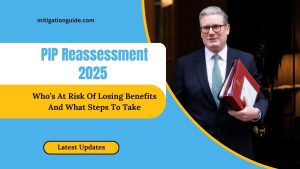The Department for Work and Pensions (DWP) is proposing significant reforms to the eligibility criteria for the daily living component of Personal Independence Payment (PIP).
These changes, expected to take effect in November 2026, could result in a substantial reduction in the number of claimants.
Below, we provide an overview of the key details, the expected impact, and the new eligibility requirements.
Projected Impact of Eligibility Changes
The DWP’s predictions highlight that the proposed changes could lead to 370,000 current PIP claimants losing their entitlement by the 2029/30 financial year after their cases are reviewed.
Additionally, the reforms are expected to affect 430,000 future claimants, who will no longer qualify for PIP once the new rules are implemented. On average, these individuals could experience an annual loss of £4,500.
Projected Caseload Changes
Despite these reductions, the total number of PIP claimants in the UK is still forecasted to grow. The reforms are expected to decrease the overall PIP caseload by 400,000 by 2029/30, but the total number of claimants is anticipated to rise by over 750,000 (around 24%) over the next five years.
Current Statistics on PIP Claimants
As of the end of January, 3.7 million people were receiving PIP in the UK, according to the DWP’s latest data.
Liz Kendall, the Secretary of State for Work and Pensions, emphasized the growing number of claims, with more than 1,000 claims granted daily, highlighting the need for reforms to ensure the sustainability of the welfare system.
Key Reform Details
The reforms are subject to parliamentary approval and are set to be implemented in November 2026.
The proposals focus on the daily living component and include a shift to face-to-face assessments, moving away from the current remote assessment system (via phone, video calls, or paper forms).
Impact on PIP Payments
The proposed reforms will not freeze PIP payments. These payments will continue to be non-means-tested and will rise in line with the September inflation rate.
However, changes to the points scoring system and eligibility criteria for the daily living component are expected to significantly reduce the number of claimants who qualify.
New Eligibility Criteria for Daily Living Component
The daily living component is currently valued between £290.60 and £434.20 every four weeks. However, by the 2025/26 financial year, this amount will increase to £295.60 and £441.60.
A key proposal includes setting a new minimum score of 4 points on the daily living questionnaire to determine eligibility. Those scoring less than 4 points in any of the 10 categories will lose their entitlement.
The 10 Daily Living Categories
The PIP application includes a detailed health questionnaire, consisting of 10 questions that assess daily living tasks such as:
- Eating, drinking, and preparing food
- Washing, bathing, using the toilet
- Dressing and undressing
- Managing medications and treatments
- Communicating and socializing
Each question has descriptors to evaluate a claimant’s condition, and points are awarded based on the severity of their needs.
Daily Living Component Descriptors and Points
| Activity | Max Points Awarded |
|---|---|
| Preparing food | 8 |
| Taking medication | 10 |
| Managing therapy or health condition | 8 |
| Washing and bathing | 8 |
| Managing toilet needs or incontinence | 8 |
| Dressing and undressing | 8 |
| Communicating verbally | 12 |
| Reading and understanding symbols and words | 8 |
| Engaging with others face-to-face | 8 |
| Making budgeting decisions | 6 |
Scoring System for Eligibility
To qualify for the daily living component of PIP, claimants must score at least 8 points from the total of the questions. 8-11 points will award the standard rate and 12 or more points will qualify for the enhanced rate.
The mobility component follows a similar scoring structure, where 8-11 points earns the standard rate, and 12 or more points leads to the enhanced rate.
Financial Impact of Reforms
The Government has projected that the reforms could result in savings of over £5 billion by 2029/30. However, the actual financial impact on individual claimants will vary based on the results of the revised assessment process.
The proposed reforms to PIP eligibility will bring substantial changes to how daily living support is assessed in the UK. While the intended savings may help the welfare system’s sustainability, the impact on claimants could be significant.
Those currently claiming PIP or considering applying in the future should stay informed about these changes, especially the new eligibility criteria and points scoring system, which could affect their entitlement.
FAQs
What are the proposed changes to PIP eligibility?
The government plans to introduce a minimum eligibility score of 4 points for the daily living component of PIP. Claimants must score at least 8 points overall to qualify for benefits, and those scoring below 4 points in all categories will lose their entitlement.
How will face-to-face assessments be different from current procedures?
The proposed reforms will introduce more face-to-face assessments, replacing the current remote methods like phone or video calls, to better assess claimants’ needs.
Will PIP payment amounts change?
Yes, the daily living component payments will increase in 2025/26, rising from £290.60-£434.20 to £295.60-£441.60 every four-week payment period.
How much could future claimants lose under these reforms?
The proposed changes could cause 430,000 future claimants to lose eligibility for PIP, with an average loss of £4,500 annually.




